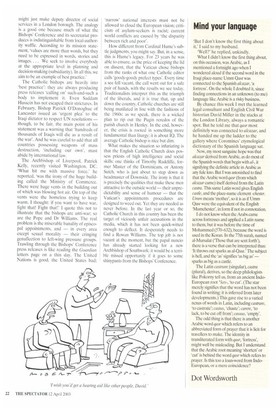Mind your language
'But I don't know the first thing about it,' I said to my husband.
'Well?' he replied, unkindly.
What I didn't know the first thing about, on this occasion, was Arabic, as I mentioned a fortnight ago when I wondered aloud if the second word in the Iraqi place-name Umm Qasr was connected to the Spanish alcazar, 'a fortress'. On the whole I doubted it, since finding connections in an unknown (to me) language like Arabic is a risky business.
By chance this week I met the learned legal consultant and English Civil War historian David Miller in the stacks at the London Library, always a romantic spot. But he told me that qasr most definitely was connected to alcazar, and he handed me up the ladder to the gallery where Coromines' etymological dictionary of the Spanish language sat.
Now, my most sanguine hope was that alcazar derived from Arabic, as do most of the Spanish words that begin with a/-, it signifying the definite article in Arabic as any fule kno. But I was astonished to find that the Arabic word qasr (from which alcazar came) itself derived from the Latin castra. This same Latin word gives English castle, and the place-name element -chester. Umm means 'mother', so it is as if Umm Qasr were the equivalent of the English `Mumchester', in form if not in connotation.
I do not know when the Arabs came across fortresses and applied a Latin name to them, but it was before the time of Mohammed (570-632), because the word is used in the Koran. In the 77th surah, named al-Mursalat (Those that are sent forth'), there is a verse that can be interpreted thus: 'It throws out sparks as al-Qasr.' The subject is hell, and the 'as' signifies 'as big as' — sparks as big as a castle.
The Latin castrum (singular), castra (plural), derives, so the deep philologists like Pokorny tell us, from an ancient IndoEuropean root *kes-, 'to cut'. (The star merely signifies that the word has not been found in writing; it is inferred from later developments.) This gave rise to a varied nexus of words in Latin, including castrare, 'to castrate'; castus, `chaste'; carere, 'to lack, to be cut off from'; cassus, 'empty'.
The odd thing is that there is another Arabic word qasr which refers to an abbreviated form of prayer that it is licit for travellers to make. The identity in transliterated form with qasr, 'fortress', might well be misleading. But I understand that the Arabic root meaning 'shorten' or 'cue is behind the word qasr which refers to prayer. Is this too a loan-word from IndoEuropean, or a mere coincidence?
Dot Wordsworth


































































 Previous page
Previous page